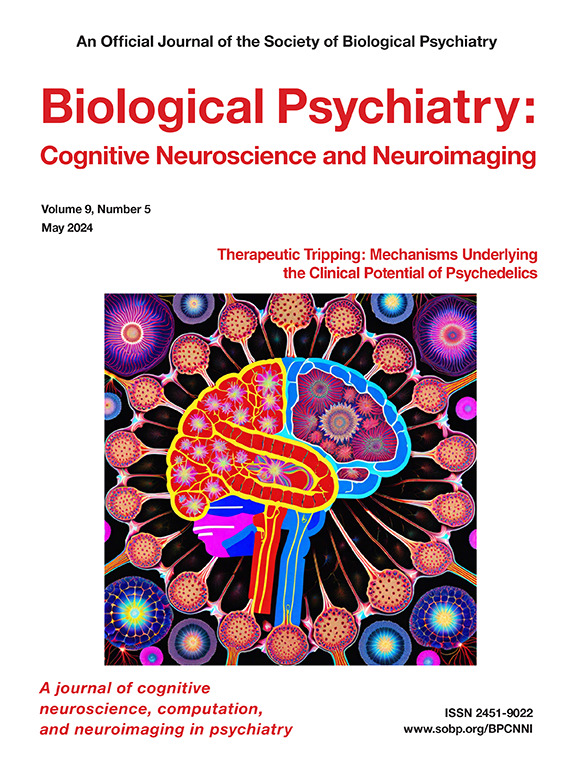通过计算精神病学处理作为跨诊断目标的改变预期。
IF 4.8
2区 医学
Q1 NEUROSCIENCES
Biological Psychiatry-Cognitive Neuroscience and Neuroimaging
Pub Date : 2025-09-01
DOI:10.1016/j.bpsc.2025.02.014
引用次数: 0
摘要
对未来经历的预期是一种重要的认知功能,在各种精神疾病中受到影响。尽管研究取得了重大进展,但对改变预期的机制仍然知之甚少,而且在很大程度上缺乏有效的靶向治疗。本综述提出了一种综合计算精神病学方法来解决这些挑战。我们首先概述了在不同的精神疾病中,包括精神分裂症、重度抑郁症、焦虑症、物质使用障碍和饮食障碍,如何改变预期,并总结了使用自我报告量表和基于任务的神经影像学进行的广泛研究所获得的见解,尽管存在明显的局限性。然后,我们探讨了新兴的计算建模方法,如强化学习和预期效用理论,如何克服这些限制,并对潜在机制和个体差异提供更深入的见解。我们建议整合这些跨学科的方法可以提供全面的跨诊断见解,帮助发现新的治疗靶点和推进精确精神病学。本文章由计算机程序翻译,如有差异,请以英文原文为准。
Addressing Altered Anticipation as a Transdiagnostic Target Through Computational Psychiatry
Anticipation of future experiences is a crucial cognitive function impacted in various psychiatric conditions. Despite significant research advancements, the mechanisms that underlie altered anticipation remain poorly understood, and effective targeted treatments are largely lacking. In this review, we propose an integrated computational psychiatry approach to addressing these challenges. We begin by outlining how altered anticipation presents across different psychiatric conditions, including schizophrenia, major depressive disorder, anxiety disorders, substance use disorders, and eating disorders, and summarizing the insights that have been gained from extensive research using self-report scales and task-based neuroimaging despite notable limitations. Then, we explore how emerging computational modeling approaches, such as reinforcement learning and anticipatory utility theory, could overcome these limitations and offer deeper insights into underlying mechanisms and individual variations. We propose that integrating these interdisciplinary methodologies can offer comprehensive transdiagnostic insights, aiding the discovery of new therapeutic targets and advancing precision psychiatry.
求助全文
通过发布文献求助,成功后即可免费获取论文全文。
去求助
来源期刊

Biological Psychiatry-Cognitive Neuroscience and Neuroimaging
Neuroscience-Biological Psychiatry
CiteScore
10.40
自引率
1.70%
发文量
247
审稿时长
30 days
期刊介绍:
Biological Psychiatry: Cognitive Neuroscience and Neuroimaging is an official journal of the Society for Biological Psychiatry, whose purpose is to promote excellence in scientific research and education in fields that investigate the nature, causes, mechanisms, and treatments of disorders of thought, emotion, or behavior. In accord with this mission, this peer-reviewed, rapid-publication, international journal focuses on studies using the tools and constructs of cognitive neuroscience, including the full range of non-invasive neuroimaging and human extra- and intracranial physiological recording methodologies. It publishes both basic and clinical studies, including those that incorporate genetic data, pharmacological challenges, and computational modeling approaches. The journal publishes novel results of original research which represent an important new lead or significant impact on the field. Reviews and commentaries that focus on topics of current research and interest are also encouraged.
 求助内容:
求助内容: 应助结果提醒方式:
应助结果提醒方式:


